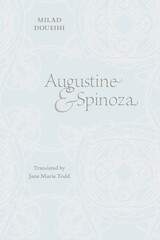
Election and grace are two key concepts that not only have shaped the relations between Judaism and Christianity, but also have formed a cornerstone of the Western philosophical discourse on the evolution and progress of humanity. Though Augustine and Spinoza can be shown to share a methodological approach to these concepts, their conclusions remain radically different. For the Church Father Augustine, grace defines human nature by the potential availability of divine intervention, thus setting the stage for the institutional and political legitimacy of the Church, the Christian state, and its justice. For Spinoza, on the other hand, election represents a unique but local form of divine intervention, marked by geography and historical context.
Milad Doueihi maps out the consequences of such an encounter between these two thinkers in terms of their philosophical heritage and its continued relevance for contemporary discussions of religious diversity and autonomy.
Augustine asserts a theological foundation for the political, whereas Spinoza radically separates philosophy, and thus authority, from theology in order to solicit a political democracy. In this sharply argued and deeply learned book, Milad Doueihi shows us how interconnections between the two thinkers have come to shape Western philosophy.
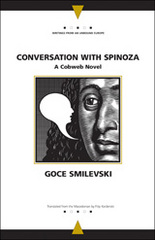
Smilevski's novel brings the thinker Spinoza and his inner life into conversation with the outer, all-too-real facts of his life and his day--from his connection to the Jewish community of Amsterdam, his excommunication in 1656, and the emergence of his philosophical system to his troubling feelings for his fourteen-year-old Latin teacher Clara Maria van den Enden and later his disciple Johannes Casearius. From this conversation there emerges a compelling and complex portrait of the life of an idea--and of a man who tries to live that idea.
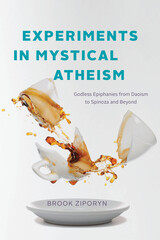
Western philosophy is stuck in an irresolvable conflict between two approaches to the spiritual malaise of our times: either we need more God (the “turn to religion”) or less religion (the New Atheism). In this book, Brook Ziporyn proposes an alternative that avoids both totalizing theomania and meaningless empiricism. What we need, he argues, is a deeper, more thoroughgoing, even religious rejection of God: an affirmative atheism without either a Creator to provide meaning or finite creatures in need of it—a mystical atheism.
In the legacies of Daoism and Buddhism as well as Spinoza, Nietzsche, and Bataille, Ziporyn discovers a critique of theism that develops into a new, positive sensibility—at once deeply atheist and richly religious. Experiments in Mystical Atheism argues that these “godless epiphanies” hold the key to renewing philosophy today.
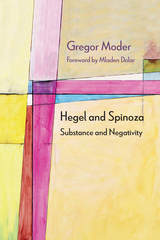
Hegel and Spinoza traces the historical roots of these alternatives and shows how contemporary discussions between Heideggerians and Althusserians, Lacanians and Deleuzians are a variation of the disagreement between Hegel and Spinoza. Throughout, Moder persuasively demonstrates that the best way to read Hegel and Spinoza is not in opposition or contrast but together: as Hegel and Spinoza.

Hegel or Spinoza is the first English-language translation of the modern classic Hegel ou Spinoza. Published in French in 1979, it has been widely influential, particularly in the work of the philosophers Alain Badiou, Antonio Negri, and Gilles Deleuze.
Hegel or Spinoza is a surgically precise interrogation of the points of misreading of Spinoza by Hegel. Pierre Macherey explains the necessity of Hegel’s misreading in the kernel of thought that is “indigestible” for Hegel, which makes the Spinozist system move in a way that Hegel cannot grasp. In doing so, Macherey exposes the limited and situated truth of Hegel’s perspective—which reveals more about Hegel himself than about his object of analysis. Against Hegel’s characterization of Spinoza’s work as immobile, Macherey offers a lively alternative that upsets the accepted historical progression of philosophical knowledge. He finds in Spinoza an immanent philosophy that is not subordinated to the guarantee of an a priori truth.
Not simply authorizing a particular reading—a “good” Spinoza against a “bad” Hegel—Hegel or Spinoza initiates an encounter that produces a new understanding, a common truth that emerges in the interval that separates the two.
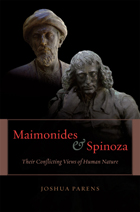
Until the last century, it was generally agreed that Maimonides was a great defender of Judaism, and Spinoza—as an Enlightenment advocate for secularization—among its key opponents. However, a new scholarly consensus has recently emerged that the teachings of the two philosophers were in fact much closer than was previously thought. In his perceptive new book, Joshua Parens sets out to challenge the now predominant view of Maimonides as a protomodern forerunner to Spinoza—and to show that a chief reason to read Maimonides is in fact to gain distance from our progressively secularized worldview.
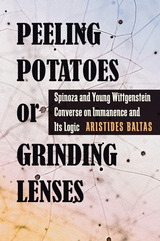
“I can work best now while peeling potatoes. . . . It is for me what lens-grinding was for Spinoza.”—L. Wittgenstein
More than 250 years separate the publication of Baruch Spinoza’s Ethics and Ludwig Wittgenstein’s Tractatus Logico-Philosophicus. Both are considered monumental philosophical treatises, produced during markedly different times in human history, and notoriously challenging to interpret. In Peeling Potatoes or Grinding Lenses, Aristides Baltas contends that these works bear a striking similarity based on the idea of “radical immanence.” Each purports to understand the world, thought, and language from the inside and in a way leading to the dissolution of all philosophy. In that guise, both offer a powerful argument against fundamentalism of all sorts and kinds.
To Spinoza, God is just Nature. God is not above or separate from the world, humanity, or mere objects for, as Nature, He inheres in everything. To Wittgenstein, logic is not above or separate from language, thought, and the world. The hardness of the logical “must” inheres in states of affairs, facts, thoughts, and linguistic acts. Outside there are no truths or sense—only nonsense.
Through close readings of the texts based on lessons drawn from radical paradigm change in science, Baltas finds in both works a single-minded purpose, implacable reasoning, and an austerity of style that are rare in the history of philosophy. He analyzes the structure and content of each treatise, the authors’ intentions, the limitations and possibilities afforded by scientific discovery in their respective eras, their radical opposition to prevailing philosophical views, and draws out the particulars, as well as the implications, of the arresting match between the two.

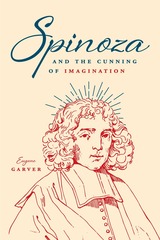
Spinoza initially presents imagination as an inadequate and confused way of thinking, always inferior to ideas that adequately represent things as they are. It would seem to follow that one ought to purge the mind of imaginative ideas and replace them with rational ideas as soon as possible, but as Garver shows, the Ethics don’t allow for this ultimate ethical act until one has cultivated a powerful imagination. This is, for Garver, “the cunning of imagination.” The simple plot of progress becomes, because of the imagination, a complex journey full of reversals and discoveries. For Garver, the “cunning” of the imagination resides in our ability to use imagination to rise above it.
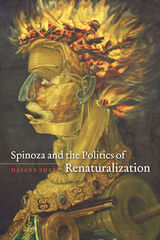
READERS
Browse our collection.
PUBLISHERS
See BiblioVault's publisher services.
STUDENT SERVICES
Files for college accessibility offices.
UChicago Accessibility Resources
home | accessibility | search | about | contact us
BiblioVault ® 2001 - 2024
The University of Chicago Press









